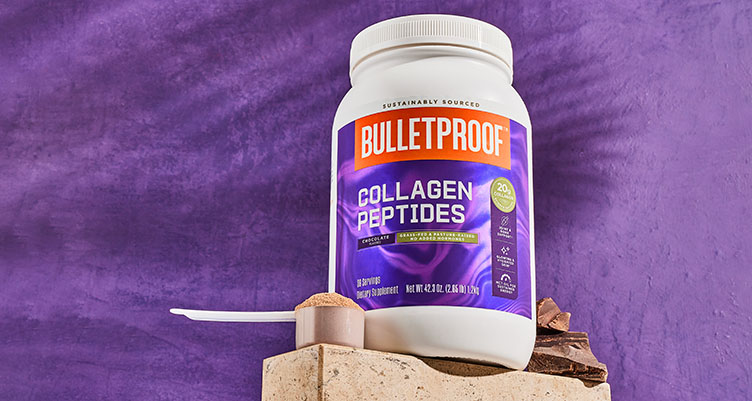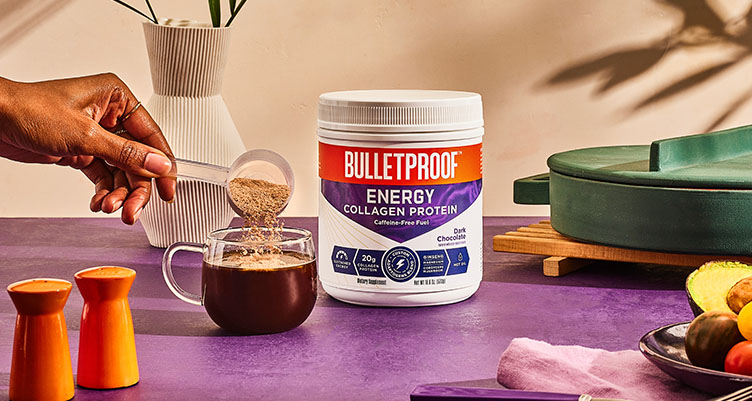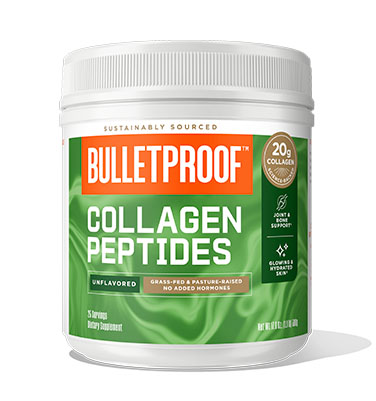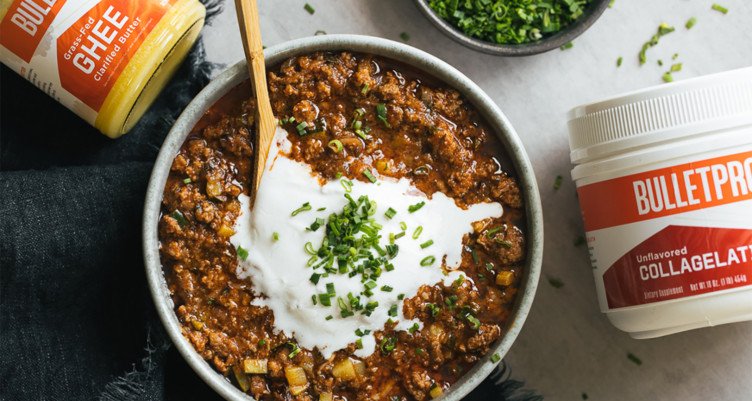How Much Collagen Per Day to Take

- Collagen is one of the most abundant proteins in your body and contributes to many essential functions.
- Taking a collagen supplement can help you get your daily dose of amino acids not normally found in the protein you usually eat.
- There are many ways to easily include collagen supplements in your diet, like by adding them to your favorite meals and drinks.
Collagen is one of your body’s unsung heroes. From contributing to healthy skin to supporting flexibility in your joints, collagen plays an important role in fueling your daily activities. The question is: how much collagen per day is enough?
Collagen supplements can help ensure your collagen levels are sufficient to support your body’s many functions. But you may be wondering how much you should take and how to take it. Read on to learn more about supplementing with this powerhouse protein, including how to incorporate it into your weekly meal planning.
Why should I take collagen?

As the most abundant protein in the body, collagen contributes to many aspects of your health. It forms the structural foundation for your skin, bones, joints, muscles, and more.[1] Think of it as the scaffolding that supports your physical structure. But, as you age, your natural collagen production declines. This may lead to wrinkles, joint discomfort and reduced mobility.[2]
Although you can get collagen from certain foods, collagen supplements can be a practical way to make sure you’re getting enough. If you’re considering adding collagen supplements to your diet, consult with a healthcare professional to discuss your specific needs and determine the right dosage for you. Choose high-quality collagen supplements from a reputable brand to maximize their potential benefits.
Different types of collagen and their benefits
There are 28 different types of collagen in the body.[3] When shopping for supplements, you’ll most likely see five different types of collagen listed on the products. What’s the difference between them?
- Type 1: This type of collagen is the building block for healthy skin. Because our collagen production decreases with age, using supplements featuring type 1 collagen can be beneficial.[4]
- Type 2: TThis is the primary collagen found in cartilage and supports healthy joints.[5]
- Type 3: Typically found in the same locations as type 1, type 3 collagen is a significant component of your organs and skin.[6]
- Type V: This collagen is commonly found in various connective tissues, such as the skin, tendons, and blood vessel walls.[7]
- Type X: This type helps bone formation in articular cartilage.[8]
The best type of collagen supplement for you depends on your specific health goals and needs. But, the most common ones are types I, II, and III, which play essential roles in different parts of your body. One convenient way to get your daily dose is with hydrolyzed collagen.
The scoop on hydrolyzed collagen
Hydrolyzed collagen makes it easy for your body to put this vital protein straight to work. You may also see it referred to as collagen peptides. It’s a form of collagen that has undergone a process called hydrolysis. This process breaks down collagen protein into smaller, easy-to-digest peptides or amino acids.
As a result, hydrolyzed collagen is a more bioavailable (easier for your body to absorb) and soluble form of collagen compared to native collagen found in foods like bone broth or animal skin. A convenient aspect of hydrolyzed collagen is that it easily dissolves in beverages. It’s a great add-in to your daily cup of Bulletproof Coffee or smoothie recipe.
If you’re following a vegan diet or prefer not to eat animal products, note that many supplements derive collagen from animal sources. Some marine collagen supplements derive collagen from fish, while other plant-based supplements don’t actually contain any collagen but can help support your body’s own production of this important protein. Look for phrases like “bovine collagen” or “marine collagen” to help you determine whether the collagen is animal or plant-based.
How does Bulletproof Collagen Compare?

Food SourceGlycine g/100g
Bulletproof Collagen Peptides21.4g*
Beef, top round22.2g**
Soybean, dry roasted seeds1.8g
Chicken, roasted with skin1.8g
Egg, whole dried1.6g
Pork, tenderloin1.5g
Milk, dry nonfat770mg
Tempeh750mg
Quinoa, cooked220mg
* Data from Bulletproof Collagen suppliers.
** All other Data from USDA National Nutrient Database for Standard Reference (Release 28,
released September 2015, slightly revised May 2016) and USDA Branded Food Products Database.
How much collagen per day should I take?
There is no official recommended dose of collagen, like those for vitamins and minerals. However, your body does need the amino acids from collagen, like glycine, proline and hydroxyproline every single day.[9]
Glycine is a nonessential amino acid that helps your body produce a key antioxidant called glutathione.[10] Unfortunately, glycine is not present in significant amounts in the regular sources of protein you eat every day. That’s one of the reasons why collagen supplements can help you access more amino acids to fuel your body. But how should you start taking collagen?
First of all, determine your health goals by speaking to your health practitioner or nutritionist. Do you want to improve your skin’s elasticity? Are you looking to support your joints? Are you an athlete wanting to build muscle mass? The right amount of collagen for your lifestyle depends on many factors, like your daily activity levels, current diet, medical history and more.
As a general guideline, though, recommendations range from 5 to 15 grams of collagen per day for adults.[11] Depending on your health goals, you will have to adjust the dose to suit your needs. And adding vitamin C to your collagen intake may help support your body’s ability to absorb it.[12]
As for the time of day to take collagen supplements, that’s up to you. If you want to take it daily, try incorporating it into your routine when you remember. For example, adding collagen peptides to your morning coffee or a collagen protein bar as a midday snack are convenient ways to make sure you take your daily dose.
Basically, you can take collagen whenever it’s most convenient for you. It’s not a stimulant, so it won’t keep you up if you take it before bed. Taking it at night can help provide replenishing amino acids to support healthy skin, bones and joints. And taking it during the day at a higher dose can potentially help provide relief from joint pain during and after exercise.13 Adapt your collagen intake according to what works best for you.
What happens if I take too much collagen?

f there are so many benefits of collagen, you might be wondering if it’s a good idea to take even more than the recommended dose. But with collagen, as with any other dietary supplement, more isn’t always better. Can you take too much collagen? Stay within your recommended intake of daily protein based on your goals and needs.
Taking too much collagen (or other proteins) may cause you to feel side effects like indigestion or intestinal discomfort, but it’s not likely to harm you beyond that. Collagen is a safe and non-toxic daily supplement that usually doesn’t cause adverse effects. If you’re incorporating collagen supplements into your diet, start small and see how you feel.
How to up your collagen intake

If you want to increase your daily collagen intake, there are plenty of delicious and easy ways to do it. A few of our favorites include:
- Bulletproof Collagen Peptides: With 20 grams of collagen protein per serving, this supplement is the perfect add-in for smoothies, Bulletproof Coffee and other beverages. Unflavored collagen peptides blend in seamlessly without changing the taste. Or, add some sweetness to your day with either Vanilla or Chocolate collagen peptides powder. And if you really want to take your collagen supplement game to the next level, try Bulletproof Unflavored Gut Health Collagen Protein for added microbiome support.
- Bulletproof Energy Collagen Protein: This versatile supplement contains collagen protein, all nine essential amino acids, MCT oil and our custom energy blend. While Vanilla Bean may lead to more flavor experimentation, Dark Chocolate collagen protein will definitely hit that sweet spot.
- Bulletproof Collagelatin: If you love to cook, this is the perfect add-in to your recipes. It blends easily into hot soups, sauces, jellies and puddings as a thickening agent.
- Bulletproof Collagen Protein Bars: Need a quick snack that will satisfy your cravings? Reach for a Bulletproof Vanilla Shortbread Collagen Protein Bar. These satisfying treats contain 11 grams of protein from hydrolyzed collagen and cashew butter. Other favorite flavors include Chocolate Chip Cookie Dough and Fudge Brownie.
- Bulletproof Unflavored Gut Health Collagen Protein: Not only does this flavorless supplement contain the right nutrients for healthy digestion and a thriving gut microbiome, but it also provides 10 grams of grass-fed collagen protein per serving to support healthy bones, muscles and joints.
Related: 14 Collagen Peptide Recipes to Make Your Skin Glow
Bulletproof recipes for collagen support

It’s easy to sneak in different types of collagen to your meals and drinks. Explore some of our most popular keto, low-carb, and paleo diet recipes to try today.
No-Bean Keto Chili
Made with grass-fed ground beef or lamb and flavorful spices like cayenne pepper, cumin and chili powder, this bean-free keto chili is a warm and hearty meal. The addition of Collagelatin makes it a good source of daily collagen, too.
Zoodles With Keto Alfredo Sauce
Eating healthy and fueling your body doesn’t mean you have to give up all your favorite foods. If you’re feeling like Italian tonight, whip up this low-carb alfredo recipe that doesn’t skimp one bit on flavor. The secret ingredient is unflavored collagen powder for the creamy cashew-based sauce that tops a heap of nutrient-rich zucchini noodles.
Homemade Collagen Bone Broth
Once you make this homemade collagen bone broth recipe, you’ll never go back to store-bought. Not only is it hearty and delicious, but the added collagen protein helps provide an extra boost for your skin, muscles and joints.
No-Bake Protein Brownie Bites
These chocolatey delights are so decadent, you may forget they’re actually good for you. With the help of chocolate collagen protein powder (plus, quality fats from Bulletproof Grass Fed-Ghee), these take just 15 minutes to make, from start to finish.
The bottom line: Collagen supplements have many health benefits and can help you look and feel your best, no matter how or when you like to take them. Though taking too much collagen likely won’t hurt you, it’s best to work with a healthcare provider to determine the right amount of daily collagen for you.
Now sure exactly how much protein you should consume every day? Check out this handy guide to help determine your ideal protein intake.
Sign up for early access to sales, product launches, the latest Bulletproof news and more!
This article has been updated with new content.



